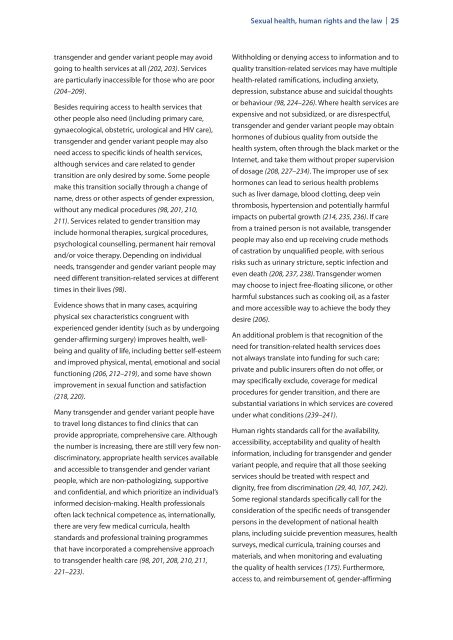Sexual health human rights and the law
1XoaDvM
1XoaDvM
Create successful ePaper yourself
Turn your PDF publications into a flip-book with our unique Google optimized e-Paper software.
<strong>Sexual</strong> <strong>health</strong>, <strong>human</strong> <strong>rights</strong> <strong>and</strong> <strong>the</strong> <strong>law</strong> | 25<br />
transgender <strong>and</strong> gender variant people may avoid<br />
going to <strong>health</strong> services at all (202, 203). Services<br />
are particularly inaccessible for those who are poor<br />
(204–209).<br />
Besides requiring access to <strong>health</strong> services that<br />
o<strong>the</strong>r people also need (including primary care,<br />
gynaecological, obstetric, urological <strong>and</strong> HIV care),<br />
transgender <strong>and</strong> gender variant people may also<br />
need access to specific kinds of <strong>health</strong> services,<br />
although services <strong>and</strong> care related to gender<br />
transition are only desired by some. Some people<br />
make this transition socially through a change of<br />
name, dress or o<strong>the</strong>r aspects of gender expression,<br />
without any medical procedures (98, 201, 210,<br />
211). Services related to gender transition may<br />
include hormonal <strong>the</strong>rapies, surgical procedures,<br />
psychological counselling, permanent hair removal<br />
<strong>and</strong>/or voice <strong>the</strong>rapy. Depending on individual<br />
needs, transgender <strong>and</strong> gender variant people may<br />
need different transition-related services at different<br />
times in <strong>the</strong>ir lives (98).<br />
Evidence shows that in many cases, acquiring<br />
physical sex characteristics congruent with<br />
experienced gender identity (such as by undergoing<br />
gender-affirming surgery) improves <strong>health</strong>, wellbeing<br />
<strong>and</strong> quality of life, including better self-esteem<br />
<strong>and</strong> improved physical, mental, emotional <strong>and</strong> social<br />
functioning (206, 212–219), <strong>and</strong> some have shown<br />
improvement in sexual function <strong>and</strong> satisfaction<br />
(218, 220).<br />
Many transgender <strong>and</strong> gender variant people have<br />
to travel long distances to find clinics that can<br />
provide appropriate, comprehensive care. Although<br />
<strong>the</strong> number is increasing, <strong>the</strong>re are still very few nondiscriminatory,<br />
appropriate <strong>health</strong> services available<br />
<strong>and</strong> accessible to transgender <strong>and</strong> gender variant<br />
people, which are non-pathologizing, supportive<br />
<strong>and</strong> confidential, <strong>and</strong> which prioritize an individual’s<br />
informed decision-making. Health professionals<br />
often lack technical competence as, internationally,<br />
<strong>the</strong>re are very few medical curricula, <strong>health</strong><br />
st<strong>and</strong>ards <strong>and</strong> professional training programmes<br />
that have incorporated a comprehensive approach<br />
to transgender <strong>health</strong> care (98, 201, 208, 210, 211,<br />
221–223).<br />
Withholding or denying access to information <strong>and</strong> to<br />
quality transition-related services may have multiple<br />
<strong>health</strong>-related ramifications, including anxiety,<br />
depression, substance abuse <strong>and</strong> suicidal thoughts<br />
or behaviour (98, 224–226). Where <strong>health</strong> services are<br />
expensive <strong>and</strong> not subsidized, or are disrespectful,<br />
transgender <strong>and</strong> gender variant people may obtain<br />
hormones of dubious quality from outside <strong>the</strong><br />
<strong>health</strong> system, often through <strong>the</strong> black market or <strong>the</strong><br />
Internet, <strong>and</strong> take <strong>the</strong>m without proper supervision<br />
of dosage (208, 227–234). The improper use of sex<br />
hormones can lead to serious <strong>health</strong> problems<br />
such as liver damage, blood clotting, deep vein<br />
thrombosis, hypertension <strong>and</strong> potentially harmful<br />
impacts on pubertal growth (214, 235, 236). If care<br />
from a trained person is not available, transgender<br />
people may also end up receiving crude methods<br />
of castration by unqualified people, with serious<br />
risks such as urinary stricture, septic infection <strong>and</strong><br />
even death (208, 237, 238). Transgender women<br />
may choose to inject free-floating silicone, or o<strong>the</strong>r<br />
harmful substances such as cooking oil, as a faster<br />
<strong>and</strong> more accessible way to achieve <strong>the</strong> body <strong>the</strong>y<br />
desire (206).<br />
An additional problem is that recognition of <strong>the</strong><br />
need for transition-related <strong>health</strong> services does<br />
not always translate into funding for such care;<br />
private <strong>and</strong> public insurers often do not offer, or<br />
may specifically exclude, coverage for medical<br />
procedures for gender transition, <strong>and</strong> <strong>the</strong>re are<br />
substantial variations in which services are covered<br />
under what conditions (239–241).<br />
Human <strong>rights</strong> st<strong>and</strong>ards call for <strong>the</strong> availability,<br />
accessibility, acceptability <strong>and</strong> quality of <strong>health</strong><br />
information, including for transgender <strong>and</strong> gender<br />
variant people, <strong>and</strong> require that all those seeking<br />
services should be treated with respect <strong>and</strong><br />
dignity, free from discrimination (29, 40, 107, 242).<br />
Some regional st<strong>and</strong>ards specifically call for <strong>the</strong><br />
consideration of <strong>the</strong> specific needs of transgender<br />
persons in <strong>the</strong> development of national <strong>health</strong><br />
plans, including suicide prevention measures, <strong>health</strong><br />
surveys, medical curricula, training courses <strong>and</strong><br />
materials, <strong>and</strong> when monitoring <strong>and</strong> evaluating<br />
<strong>the</strong> quality of <strong>health</strong> services (175). Fur<strong>the</strong>rmore,<br />
access to, <strong>and</strong> reimbursement of, gender-affirming


